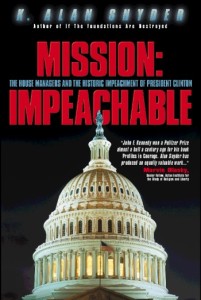Talk of impeachment is beginning. President Obama’s latest power grab, declaring publicly that he will act without Congress to get done what he considers his priorities, is rankling those who are committed to the delicate separation of powers established by the Constitution. Is this just talk? Are there sufficient grounds for impeachment? Is it even politically feasible?
Impeaching a president is a big step. Two presidents have been formally impeached: Andrew Johnson and Bill Clinton. A third, Richard Nixon, resigned before it could come to a full vote in the House of Representatives. To be impeached simply means to be accused by a majority of the House of actions warranting removal from office. In both cases when the House approved articles of impeachment, neither president was removed from office after a trial in the Senate. The Senate has the final say on articles of impeachment, and in the case of a president, two-thirds of that body must vote for removal.
The vote for Johnson’s removal was very close. It fell just one vote short, so he completed his term, which was less than a year anyway. For Clinton, a Republican-controlled Senate had a majority for removal, but not the two-thirds necessary; not even one Democrat joined the Republicans in favor of turning the White House over to VP Al Gore.
If you study the history of impeachment proceedings, both in Britain and America, you find that causes for removal from office can range from actual violations of law to non-criminal activity that simply brings disgrace and/or dishonor to the office. It’s not essential to find that someone has broken a law; if continuation in office is deemed to be detrimental to the proper functioning of the government, that is sufficient grounds for dismissal.
Because the Clinton impeachment is so near to us historically, that’s what most people will use as their comparison with the current president. What were Clinton’s actions that led to the impeachment? He was formally accused of perjury and obstruction of justice, both violations of law. In the background, of course, were his unseemly sexual inclinations. At the time, accusations of sexual relations with a young woman working in the White House and a sexual harassment lawsuit brought by a former Arkansas state employee formed the context for his violations. The whole thing was tawdry. I was in favor of his impeachment and removal due to the dishonor he conferred upon the presidency, not just because I disagreed with his political agenda.
 After the Senate trial ended in his acquittal, I interviewed all the House Managers who argued before the Senate for his removal. It led to a book that gave their side of the story. Nowadays, conventional wisdom says they were wrong and/or foolish to proceed with the impeachment. Even though the Senate had a majority of Republicans, getting the two-thirds vote was considered a real long shot. However, I thought it was worth the fight, if for no other reason than to stand for principle. There was at least a glimmer of hope for success, given that Republicans did control that chamber.
After the Senate trial ended in his acquittal, I interviewed all the House Managers who argued before the Senate for his removal. It led to a book that gave their side of the story. Nowadays, conventional wisdom says they were wrong and/or foolish to proceed with the impeachment. Even though the Senate had a majority of Republicans, getting the two-thirds vote was considered a real long shot. However, I thought it was worth the fight, if for no other reason than to stand for principle. There was at least a glimmer of hope for success, given that Republicans did control that chamber.
My interviews also revealed to me a group of congressmen who fought this fight for the sake of principle: no man, not even a president, is above the law. Everyone is equal before the law, and all must be held accountable. I continue to honor them today for the stand they took.
So what about President Obama? There are two considerations: has he committed impeachable offenses and is there any realistic hope that impeachment proceedings will result in his removal from office?
On the first consideration, I am of the decided opinion that he has overstepped the lawful boundaries of his authority on many occasions. He is currently attempting to rule by executive orders, a clear violation of the constitutional limitations on a president. With respect to the IRS targeting of his political foes, is there anyone who, deep down, believes this was the result of a few rogue agents who acted without the approval—either directly or with a smile and a nod—of the president? Using a federal agency to undermine political opposition is the very thing Nixon was accused of. Democrats, at that time, didn’t think it was unjust to use that as a reason for impeachment.
 Then there’s Benghazi. Regardless of whether the military could have gotten there in time to help the besieged, the massive coverup afterwards is reprehensible. Blaming the attack on some obscure video when it’s obvious now that Obama and everyone else around him knew it was a planned terrorist action, is inexcusable. Throwing the producer of the video in prison was unconscionable. And doing it all during an election season to hide the truth from an electorate deciding whether to keep Obama in office was deception of the highest order.
Then there’s Benghazi. Regardless of whether the military could have gotten there in time to help the besieged, the massive coverup afterwards is reprehensible. Blaming the attack on some obscure video when it’s obvious now that Obama and everyone else around him knew it was a planned terrorist action, is inexcusable. Throwing the producer of the video in prison was unconscionable. And doing it all during an election season to hide the truth from an electorate deciding whether to keep Obama in office was deception of the highest order.
So, yes, he has committed clearly impeachable offenses. His disregard for the Constitution seems limitless; his desire to do whatever is necessary to remain in power renders him unfit for the office.
But that brings us to the second consideration: is there a realistic hope that the Senate actually would remove him? I don’t think there’s any hope of that at all. Not only is the Senate controlled by his own party, it is more bitterly partisan now than ever. If not even one Democrat senator could bring himself or herself to vote to remove Bill Clinton from office, how is there any reasonable expectation that twenty-two of them would do so today? Any impeachment proceeding against Barack Obama would be futile.
So what can be done?
First, I applaud Sen. Rand Paul’s lawsuit against the president over the misuse of the NSA’s intelligence-gathering. How about some more lawsuits aimed at the president’s unconstitutional power grabs? Not all the courts are corrupt. There are still some judges out there who revere the rule of law.
Second, focus laser-like on the upcoming congressional elections. If Republicans can take back the Senate, and if a few more of those senators can grow the spines they currently lack, legislation can be passed to curtail unconstitutional activities. Yes, the president will veto all such legislation, but this will be a vital educational experience for the general public as they see a president flaunting the law so openly.
Education of the public in the principle of rule of law will provide an opening for a Republican presidential candidate who has the stomach and integrity to stand for what is right. If Republicans can unite behind a bold, principled leader, there remains a hope that the present drift of the nation politically can be turned around.
I realize a lot has to come together to make this happen. I’m not naïve. And at the root of any great reversal of national fortunes must be a spiritual revival that calls people back to foundational truths. Although we need to take the proper steps in the political realm, ultimate success rests with a Biblically grounded people. Will we be such a people?
